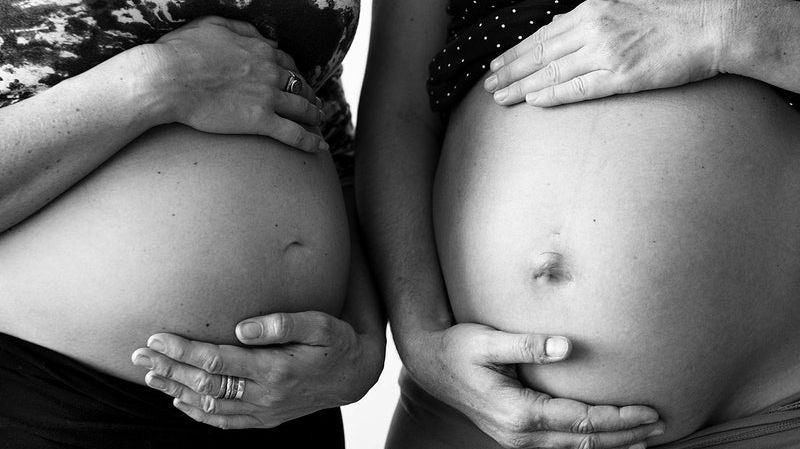Weight

Women are frequently reminded of the specific weight guidelines of 25 to 35 pounds (11.5 to 16 kg) during pregnancy, and most health care providers (HCP) check and monitor weight at every prenatal appointment. However, this constant checking is being questioned, as it may serve no real benefit; further, it could cause stress, anxiety, and unhealthy eating habits in some women.
Weight recommendations have always been controversial. To date, researchers have tried to determine the “most optimal” weight gain range that can lead to the most positive pregnancy outcomes, based on a woman’s weight/BMI prior to pregnancy (see Guidelines, below).
This does not mean that gaining weight above or below these recommendations will result in complications, but the risk for complications associated with weight gain/loss may increase when weight falls outside these ranges.
HCPs will monitor a woman's weight to help her stay within these ranges and to identify concerns early (see below). However, women do not need to be told their weight unless an HCP deems it necessary; this is a decision women should make with their HCP.
Overall, pregnant women should aim to be physically active, obtain proper nutrition, stay hydrated, enjoy their favorite foods in moderation, and avoid major weight fluctuations. Women should also ask their HCP if they have any questions regarding weight gain, loss, or nutrition during pregnancy.
Background
Various international health organizations stress the importance of “proper weight gain” during pregnancy and recommend specific ranges to avoid potential complications made more likely by additional weight gain.
In the last decade, the average weight gain during pregnancy has increased and excessive weight gain is more common, especially among women who were overweight prior to pregnancy.
How much weight a woman should gain depends on various factors, including pre-pregnancy weight and body mass index (BMI).
Note: BMI is a screening tool based on calculating weight and height. Although it is a better indicator than weight alone, it does not take muscle mass or fitness into account and is not a perfect index tool. An HCP needs to complete a physical exam for a better assessment of overall health, including a woman's body composition.
Weight gain recommendations are based on evidence that weight gain itself is the major factor for most complications. However, weight gain alone is not an indicator of poor pregnancy outcomes and there are many other factors that need to be considered, including body composition, muscle mass, and nutrition.
Further, there is no evidence indicating whether constant weight monitoring during prenatal appointments has any benefit in the risk reduction of complications.

Prior Recommendations
Weight gain recommendations during pregnancy have almost always been controversial and have ranged from weight restriction to weight gain encouragement. More than 50 years ago, it was taught that women should ideally gain 15 pounds (lbs), but no more than 25 lbs.
This was stopped in the 1970s when women who followed these restrictions were delivering babies with physical and mental disabilities, mostly due to low birth weight.
After this weight restriction was relaxed to an ideal 25 pounds (or more), infant birth weight increased to healthier levels.
Weight Gain – Overview
Gestational weight gain includes both lean and fat tissue of the mother and the fetus as well as water retention. At term, the water content of the fetus, placenta, amniotic fluid, uterus, breasts, and increased blood volume averages, at a minimum, around 6.5 liters (L) which weighs about 14 lbs (about 6 kg).
Women may also be predisposed to store fat during pregnancy, making it a lot easier to gain fat mass than at any other time. This likely occurs so the body is more efficient at energy storage to ensure women have enough stored for both themselves and their babies.
By the third trimester, a woman’s basal metabolic rate rises by 20% compared with non-pregnant women. It is estimated, on average, the total gestational period of pregnancy may require an additional 77,000 calories at 85, 285, and 475 extra calories needed per day during the first, second, and third trimesters, respectively.
In twins, the maternal metabolic rate is approximately 10% greater than women carrying one baby; evidence is lacking regarding metabolic requirements for women carrying triplets or more.
Guidelines
Numerous international health organizations recommend that women gain weight during pregnancy based on their pre-pregnancy BMI (use calculator, here).
In 2009, the United States Institute of Medicine (IOM, now called the National Academy of Medicine) and the National Research Council published new guidelines on weight gain and pregnancy, expressed in ranges. (Note: Women pregnant with twins or more can add about 20 pounds to the higher-end range):
Pre-pregnancy BMI:
BMI < 18.5: 28 to 40 lbs (12.5 to 18 kg)
BMI 18.5 to 24.9: 25 to 35 lbs (11.5 to 16 kg)
BMI 25 to 29.9: 15 to 25 lbs (7 to 11.5 kg)
BMI 30 or more: 11 to 20 lbs (5 to 9 kg)
These recommendations are based on evidence that being overweight increases the risk of various pregnancy complications, including gestational diabetes and high blood pressure, and that pre-pregnancy weight is a much better independent predictor of adverse outcomes of pregnancy.
Therefore, if a woman is overweight prior to pregnancy, it is recommended she gain less weight than women who did not start pregnancy overweight.

It is important for women to remember that the above guidelines exist to help women and HCPs identify potential risks for complications when women gain weight under or over the recommendations.
However, being under or over recommendations does not mean a woman will experience complications. The medical/research community believes the current weight ranges represent the most ideal outcomes, and being above or below the recommendations may increase risk.
Published studies suggest that during 2000 to 2009, 30% to 40% of American women gained weight within the IOM's recommended ranges, 45% gained above, and about 20% gained below.
Studies also indicate that after the first trimester, the typical pattern of weight gain is one of gradual, steady increments, but due to nausea and vomiting of pregnancy (NVP) and other factors, women’s patterns of weight gain can vary. There are no studies that determine the most optimal way/time frame to gain weight during pregnancy.
However, significant weight gain in the first trimester could cause potential metabolic concerns for the fetus during childhood. This is likely due to first trimester weight gain resulting mostly in fat deposition, rather than fetal or uterine growth. If women gain more weight than recommended in the first trimester, they can try to balance this gain during the second and third trimesters.
Common shifts in weight are also normal, based on fluid changes, bladder and bowel activity, clothing, and even the time of day. It appears the best pattern, however, may be to simply avoid major fluctuations. Gradual, progressive weight gain generally represents a gain of lean and fat tissue, whereas a spike in weight gain likely indicates fluid retention.
Note: Sudden weight gain of more than 2 to 3 pounds per week can be a "red flag" symptom indicating excessive fluid buildup that occurs from high blood pressure and/or preeclampsia. If women gain this weight during pregnancy due to unhealthy eating habits/activity restriction, it can be harder for HCPs to distinguish possible red flags for complications.
Outside of Recommendations
Gaining less than the recommended amount of weight in pregnancy is associated with delivering a baby preterm and/or with a low birth weight, as well as possible adverse neurodevelopmental outcomes (association = possible link, not a definite occurrence).
Babies born with a low birth weight can have trouble breastfeeding, may be at increased risk for illness, and may experience developmental delays. Preterm labor may also occur due to a lack of weight gain, but researchers do not yet understand why.
Note: Women should not be concerned if they do not put on weight in the first trimester, especially when dealing with moderate to severe nausea and vomiting. Women should, however, talk to their HCP about these symptoms, especially if symptoms are still present by mid-pregnancy (read more).
Conversely, gaining more than the recommended amount of weight in pregnancy is associated with having a baby with a large birth weight. This may may increase the risk of complications leading to cesarean delivery and/or obesity during childhood, as well as retained weight by the woman during the postpartum period.
Further, excess weight gain during pregnancy is assessed to adversely alter the fetal immune system, leading to a possible increased risk of allergies in the infant/child. This is heavily based on the idea that allergies in an infant/child originate during gestation.
Action
Women should talk to their HCP if they have any questions regarding weight gain, loss, or nutrition during pregnancy.
It is often recommended women have a preconception appointment with their HCP to get any medical conditions or precursors under control prior to pregnancy to increase the chances for a healthy, full-term pregnancy.
Women should aim for the most nutrition possible in each meal and stay within healthy caloric recommendations, but also enjoy favorite foods in moderation. This may help women avoid sudden, excessive weight gain fluctuations.
Women should also accompany a healthy diet with regular physical activity during pregnancy, even if this only includes walking. Physical exercise has enormous benefits during pregnancy and may reduce the risks of various complications. Read more.
Women should also consider sharing and submitting their experience below regarding weight gain or loss during pregnancy. This can help other women learn additional perspectives regarding this concern, recognize they are not alone, and that weight recommendations can be a struggle during pregnancy for many women.
Partners/Support
Partners can help women during their pregnancy by aiming to eat healthier themselves, in an effort to support the woman in her own eating and exercise habits. Further, couples who strive to eat healthier, make smarter choices, and engage in more physical activity together, are more likely to be successful.
Resources
Weight Gain During Pregnancy (U.S. Centers for Disease Control and Prevention)
Committee Opinion: Weight Gain During Pregnancy (American College of Obstetricians and Gynecologists, Reaffirmed 2016)
Why your weight matters during pregnancy and after birth (Royal College of Obstetricians and Gynaecologists, 2011)